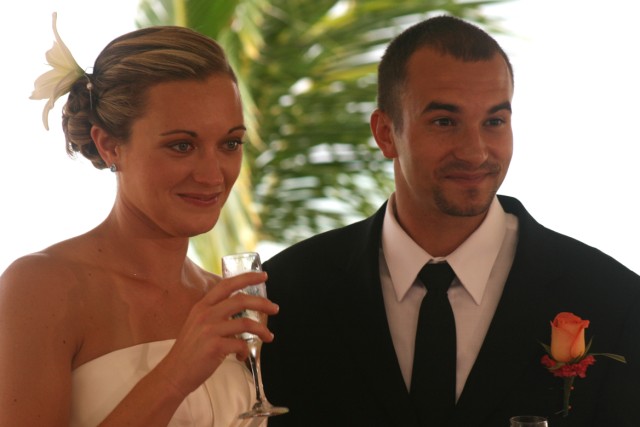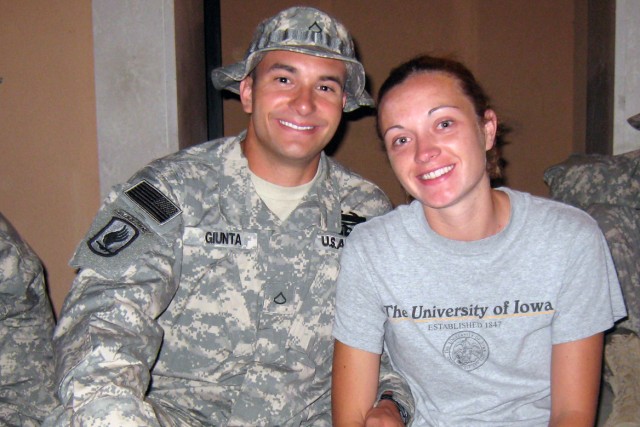WASHINGTON (Army News Service, Nov. 16, 2010) -- As President Barack Obama hangs the pale blue ribbon holding the Medal of Honor around the neck of Staff Sgt. Salvatore "Sal" Giunta in a White House Ceremony today, Giunta's wife Jennifer will be at his side, offering her quiet support, just as she has done throughout his two deployments, and especially during the whirlwind of media interviews and VIP meetings that followed the award announcement in September.
He is the first living servicemember to receive the nation's highest award for conspicuous gallantry in combat since the Vietnam War -- for stopping two terrorists from kidnapping his wounded friend during a fierce battle in Afghanistan in October 2007 -- which he said doesn't make him a hero, and she said makes her proud, of course, but doesn't change the way she feels about her husband.
"Sal's still the same guy he was before," Jennifer said as Giunta noted he still has to do the dishes at home.
"It holds a lot of meaning," she said about the medal, "and I think that he's a hero, but I think that everyone who goes is also a hero, and he did what he did, because that's the type of person he is."
They met soon after Giunta enlisted and was stationed with the 173rd Airborne Brigade Combat Team in Vicenza, Italy, where Jennifer was doing a college internship, and they were soon inseparable, so much so that she didn't want to go home at the end of the summer. He would be deploying the next winter and she knew - she knew - she had to find a way to make it work.
Letters and phone calls
"It's hard, you know, to know that he was going to go," she said. "I just thought, 'I'm going to write a lot of letters so that we can stay connected in some ways, so that hopefully when he gets back, we feel like we weren't apart as much as we really were.'"
After he returned that first time and she finished school, they knew they had to be together, so figuring she'd find a job, Jennifer left her family and friends and moved back to Italy. She never expected that Giunta would be stop-lossed and not only sent back to Afghanistan for 15 months, but sent to one of the most remote and dangerous areas of the country, the Korengal Valley, nicknamed the 'Valley of Death.'
They weren't married yet, so she didn't have access to the full benefits or support system that spouses enjoy, but Jennifer didn't want to go home to Iowa and be even farther from Giunta and the little news she could get. So she moved in with a friend who was an Army spouse, and they leaned on each other.
Because phone calls were infrequent at best and even then lasted only 15 minutes, and "when a month or two goes by, 15 minutes is like a second," she said. She and Giunta wrote letters again to stay in touch -- letters that meant everything to Giunta as he sat in his primitive firebase on a mountainside in Afghanistan, getting shot at every day.
"It was good to be able to have her there and hear her stories and be able to enjoy some life other than those mountains during that time, to get her letters. You know, she'd spray it with some perfume and I could smell the perfume. I had a little pillow and in the pillowcase, I'd just slide all the letters in my pillow, so I'd sleep on her perfume and her letters. And it matters," remembered Giunta, the tough paratrooper who took on the Taliban singlehandedly, but whose face softens when he looks at his wife during interviews.
Fate
It had been a long, hard deployment for both of them, but it wasn't even halfway over on Oct. 25, 2007, when it suddenly got much worse. Jennifer got a frantic, tearful phone call from the wife of one of the men in Giunta's unit.
"She told me that (Sgt. Joshua) Brennan - she told me that Brennan had died. And she told me that Sal was a hero and that she didn't know when I was going to hear from him," Jennifer said, crying. "I think the next day or two he called, and I was so happy to hear his voice. You build this really tight connection with them, so tight that you can tell their mood just by their voice. I could tell that he wasn't doing well, but I could also tell that when I hear that tone of voice, he doesn't want to talk about it.
"He said, 'How are you doing'' I kind of told him what I'd been doing and maybe five minutes went by and I said, 'Look, I know what happened. Are you OK' I'm so sorry. Are you OK'' And he said, 'I'm fine. Don't worry about me. I'm fine.' I said, 'Shut up. I know you're fine. I know you're physically OK, because you're talking to me right now, but are you really OK'' And again he said, 'I'm fine. I'm OK.' It was too soon for him to want to talk about it. He was talking about it to everybody else who was already there and he called me because he wanted to kind of be distracted," she continued.
In fact, it's only as he's done media interviews in the past few months that she's learned the full story of what happened on that mountainside in Afghanistan, and the battle that claimed not only Brennan, who Giunta fought so desperately to save, but also the platoon medic, Spc. Hugo Mendoza. And as much as she loves him and supports him, she can't fully imagine what it must have been like for him to go through something so tragic - no one but the other Soldiers who were there can.
The Medal of Honor
The deployment was so rough, that after their initial, giddy reunion, it took about six months for their relationship to get back to normal, Jennifer explained, adding that today their relationship is stronger because of everything they've gone through.
The world may call Giunta a hero, but he shies from the term, saying he was just trying to help a friend who would have done the same for him. He doesn't deserve any of these accolades. But Jennifer -- Jennifer is one of his heroes, and she has kept him grounded throughout the media whirl and the spotlight and the attention that he never wanted.
"My wife is awesome," he said. "I call her my equal, but you know, she's smarter than me. She's my rock. She's the person that I'll complain to. I can tell her and it doesn't come off as complaining and she'll understand and she'll help me through it. She's what keeps me on the level, because I can come in and meet different people and we can do whatever, but I need to have that 'this is my normal,' and when I go to her, she brings me down to this level and then we can talk. Regardless of what anyone says or how many lights are on us or how many cameras are pointed at us, she's what grounds me."
In fact, the spotlight is something that both prefer to avoid, and many of the spouses Jennifer knows on Vincenza came up to her after finding out about Giunta's award in the news, wanting to know why she never said anything.
"I'm very proud, but I'm not a very boastful person. I want them to like us for who we are and not this medal. So I would just like to continue to be the person I was. I haven't changed. I still talk to them in the same way," she said, adding that the bond between Army spouses has been a powerful force in her life. "We lean on each other. You want to always be supportive. I would hope that if anything happened to Sal, that I would have somebody there to help me. It can be a friend. It can be a complete stranger. You get that connection with people who have to go through the same thing as you (and) you almost don't have to say anything."
Neither Giunta is sure what the immediate future holds, only that both would like to continue their educations, and that they want Giunta's Medal of Honor to represent the sacrifices of every servicemember.
"This is for everyone who sacrifices for their country," Giunta said. "No one made us do this. We all raised our hand at one point or another and said, 'I'll do this. War, OK.' And then some of us do it again and again and again, and it's for all those people. Everybody."
Related Links:
MOH ceremony set for 1st living Soldier since Vietnam
Reluctant hero becomes first living MOH recipient since Vietnam
Staff Sergeant Salvatore A. Giunta - Medal of Honor Recipient for the United States Army




Social Sharing